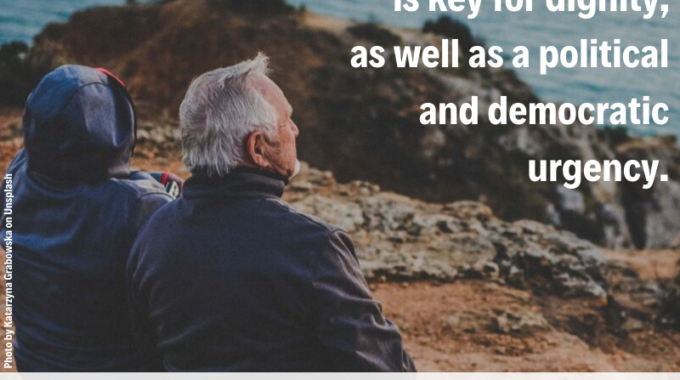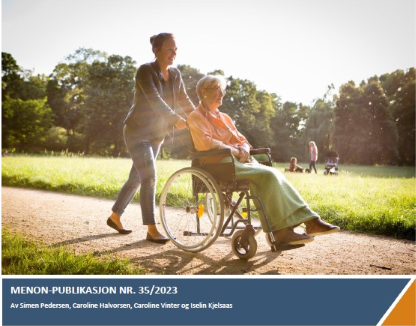
PRESS RELEASE – To preserve their legitimacy, the EU and member states need to care for citizens!

JOINT PRESS RELEASE
Brussels, Belgium – 19 September 2019
To preserve their legitimacy,
the EU and member states need to care for citizens!
Placing wellbeing at the core of our economic models and welfare states is not only an ethical but also a democratic necessity. This is the conclusion of a joint workshop on long-term care, held during the Social Platform’s conference Building Social Europe on 17 September. Together, AGE Platform Europe, COFACE Families Europe and Eurocarers urge for an EU Strategy on long-term care built on a holistic and lifecycle approach, so as to make the right to long-term care as enshrined in the European Pillar of Social Rights a reality for all in Europe.
Caring is a vital part of human existence throughout the life span and long-term care is a key prerequisite of it. Individuals may need long-term care at any period in their lives, from birth to end of life.
Due to demographic change, long-term care needs are expected to increase sharply in Europe in the coming decades. However, as it stands, people across the European Union often struggle to access quality services, while families, friends and neighbours (i.e. informal carers) provide 80% of all care with little recognition and support. The formal care sector remains unattractive due to increasingly difficult working conditions and the unappealing perception of care that prevails in our societies. This disproportionately impacts women, whom constitute the majority of care recipients, informal carers and care professionals.
Given the magnitude of this challenge, improving access to quality long-term care services is not only critical to respect the dignity of all those in need of care, it is also a political and democratic urgency.
On 17 September, AGE Platform Europe, COFACE Families Europe and Eurocarers joined forces around a workshop on long-term care, held during Social Platform’s conference Building Social Europe, organised back-to-back with the High-Level Conference on the Economy of Wellbeing of the Finnish Presidency of the EU. The workshop revealed that placing wellbeing at the heart of our economic models and welfare states is not only an ethical but also a democratic necessity. Against the backdrop of low trust in institutions, ignoring people in need of care and their informal carers may contribute to growing scepticism about European institutions and member states’ ability to provide a dignified living to everyone living in the EU.
Ensuring that Europe’s economic development leads to greater wellbeing amongst citizens includes increasing the value societies attach to care and improving substantially access to quality services for all. The right to self-determination, to choose where and with whom to live and respect for one’s dignity are universal human rights that apply to everyone. Informal carers should have the right to choose freely whether they want to be a carer and to what extent they want to be involved in caring. It is therefore important to ensure that their caring role is recognised, and that they have access to social protection, respite and work-life balance. Last but not least, ensuring good working conditions in the formal care sector is critical for the quality of services.
The right to long-term care as enshrined in the European Pillar of Social Rights is the right tool to advance. To make it a reality, the EU urgently needs a strategy on long-term care built on a holistic and lifecycle approach. This strategy should:
- Improve data collection and develop harmonized definitions, indicators and corresponding European targets on long-term care to assess the affordability, the accessibility, the quality and the availability of services.
- Encourage innovation in the sector and the sharing of good practices between member states and regions.
- Support the provision of adequate and sufficient public funding to long-term care through the European Semester.
- Strengthen the use of European funds to improve the quality of life of persons in need of care and of informal carers.
- Guarantee a systematic and meaningful involvement of civil society in policymaking processes.
The EU and member states have a leading role to play in ensuring a dignified living to both people in need of care and their informal carers. It is now more urgent than ever for the sake of European democracies and to ensure that our economies and social policies work for everyone.
For more information, please contact:
- Borja Arrue – AGE Platform Europe
borja.arrue@age-platform.eu, +32 2 280 1470
- Irene Bertana – COFACE Families Europe
Ibertana@coface-eu.org, +32 2 500 56 90
- Stecy Yghemonos – Eurocarers
sy@eurocarers.org, +32 456 14 19 50
—–
About AGE Platform Europe
AGE is a European network of organisations of and for people aged 50+ aiming to voice and promote the wellbeing of the 200 million citizens aged 50+ in the European Union and to raise awareness of the issues that concern them most. www.age-platform.eu
About COFACE Families Europe
COFACE Families Europe is a pluralistic network of civil society associations representing the interests of all families. COFACE Families Europe promotes the well-being, health and security of families and their members in a changing society and serve as a trusted entity for family mainstreaming and for the voice/needs of families in the EU and beyond. www.coface-eu.org
About Eurocarers
Eurocarers is the European network representing informal carers and their organisations, irrespective of the particular age or health need of the person they are caring for. Eurocarers works for a future in which caring is recognised and valued, and in which informal carers do not face poverty, social exclusion or discrimination. www.eurocarers.org





